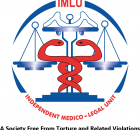By Carolyne Tunnen
As the world marked the International Day in Support of Victims of Torture on 26th June, many people do not know that torture and other cruel, inhuman or degrading treatment (CIDT) or punishment can have devastating consequences for victims, their families and even the broader community. Torture can be physical, psychological or mental. The severe injuries inflicted in a person or the trauma they go through as a result of torture, CIDT or punishment can disrupt their lives and in many times create barriers that prevent them from building interpersonal relations and pursue their personal and career aspirations. These are necessary components that lead one to an accomplished life and interact better with families and the community at large.
Where there are no interventions, or unmitigated, physical and psychological suffering resulting from torture, CIDT or punishment can last for decades and impacts not only the victims but also their families, including children. For one to fulfil their parental responsibility, they must fully provide for themselves and their families. In the African context, a man is considered as the main provider and failure for them to play this responsibility they are discriminated and considered as pariahs. What many people do not recognize is that these individual vulnerabilities affect the road to their healing. It is therefore important for individuals, families and communities to understand the impacts of torture in order for appropriate rehabilitation programmes to be developed to support their recovery.
The World Health Organisation defines rehabilitation as “a set of interventions designed to optimize functioning and reduce disability in individuals with health conditions in interaction with their environment”. The United Nations Convention against Torture under its General Comment 3 states that redress encompasses the right to rehabilitation. It articulates what rehabilitation should cover for it to be accessible, available and timely for victims of torture, and to actually provide them with the care and support needed in the process of reconstructing their lives after torture. In particular, the voice and participation of the victims is of importance in this process. These services include medical and psychological care and legal and social services to restore a victim’s independence, and physical, mental, social and vocational ability.
Rehabilitation, therefore, is key as it enables torture, CIDT or punishment victims to rebuild their lives through holistic services while empowering them. In addition, it identifies the individual needs and identities, as well as the cultural, social and political background and specific environment. This is important as it helps to design programmes that are in line with the needs. Rehabilitation services positively impact the health and well-being of victims, their families and the wider communities. In addition, it enables victims to sustain positive family and social lives and facilitates their reintegration into the workforce, which thereby strengthens social inclusion and integration, and maintains the victims and where appropriate, their family’s livelihood.
In Kenya, the Prevention of Torture Act, 2017 clearly provides for court-sanctioned rehabilitation for victims of torture, at any time, with the cost to be covered by the Victim Protection Trust Fund, which was established by the Victim Protection Act (VPA) in 2014. This provides a legal basis for victims to get the support they need to address the physical and psychological consequences of torture, including prior to the conclusion of, often prolonged, legal proceedings. Sadly, the infrastructure to support the Victim Protection Trust Fund has not been fully formed, and while the Fund’s Board is in place, a secretariat has neither been established nor the Fund resourced. Once fully equipped, the Trust will be a game changer in the criminal justice system and the victims of torture, CIDT or punishment. Therefore calling upon the Attorney General to fast-track the operationalization of the fund.
As we stand in solidarity with all the victims of torture around the world and in Kenya, we call upon States to ensure that victims of torture, CIDT or punishment have access to redress and rehabilitation as this is a momentous pointer that a country is built on the principle of the rule of law and respects the inclusion of all its citizenry.

